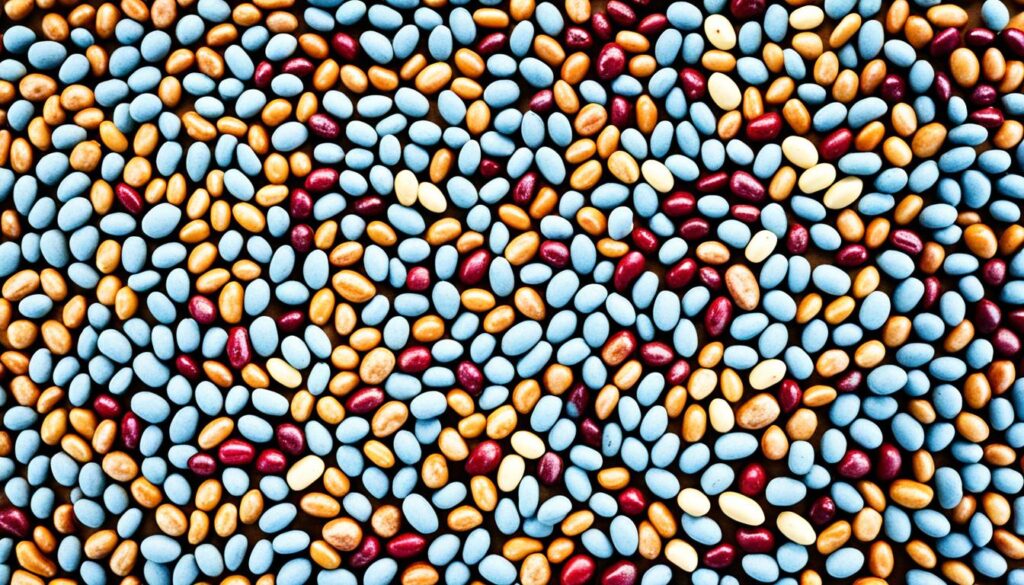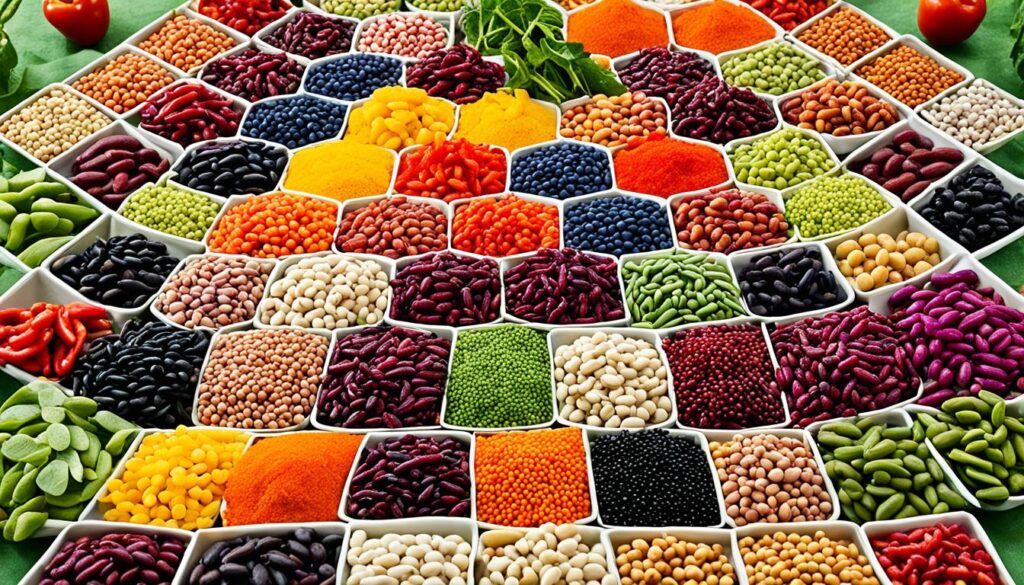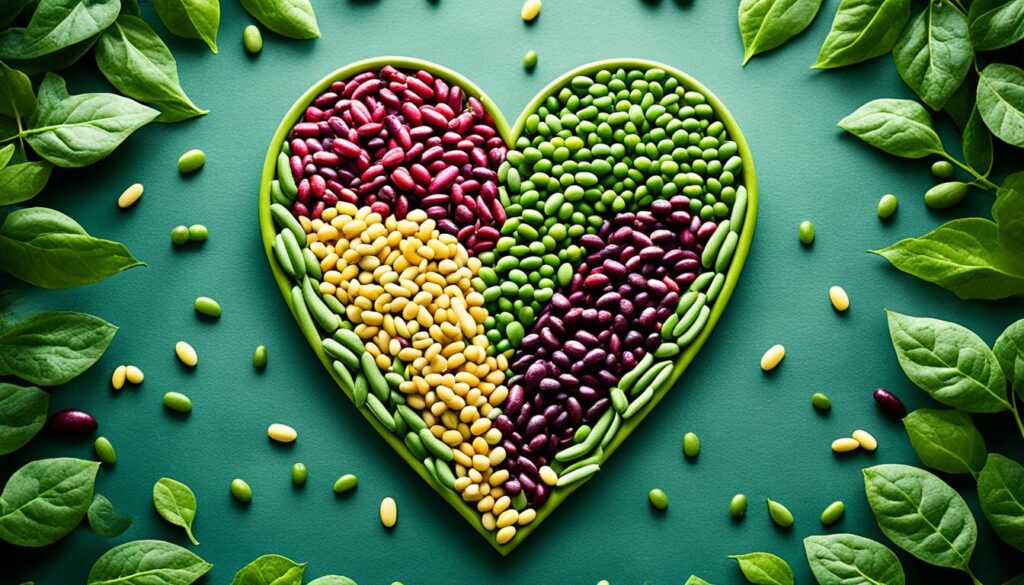Do you know how powerful beans are? These simple legumes have been feeding people for thousands of years. They do more than just taste good. They help lower cholesterol and control blood sugar levels.
Join us as we explore the world of beans. You’ll learn how they can make you healthier and help the planet. Get ready to discover the amazing benefits of beans for your health and the earth.
What are Beans?
Beans are the seeds of plants in the Fabaceae family. They are also known as legumes or pulses. These bean varieties and bean types include kidney beans, pinto beans, black beans, and chickpeas. They also include lima beans, black-eyed peas, and soybeans.
Beans belong to the legumes and edible seeds groups. They are a great addition to any diet because they are nutritious and versatile.
Defining Beans and Their Varieties
Not all legumes and pulses are called «beans.» Green beans and snap peas are legumes but not beans. They are eaten with their pods. On the other hand, heirloom beans and commodity beans are the main types of beans we talk about.
Heirloom vs. Commodity Beans
Heirloom beans are special because of their unique looks and taste. They come from seeds that haven’t mixed with other types. This makes them have different colors, textures, and flavors.
Commodity beans are bred for more yield and a uniform look. They are easier to can and process. While both types are nutritious, heirloom beans offer a more exciting taste experience.

Nutritional Benefits of Beans
Beans are full of important vitamins, minerals, and nutrients. They are known for their high fiber content. This makes them great for your health.
Beans are also packed with folate. This is very important for pregnant women.
Fiber Boosters
Beans have a lot of fiber. Eating one cup of cooked beans gives you up to 16 grams of fiber. This fiber helps control sugar levels in your blood. It also keeps your digestive system healthy.
Full of Folate
Beans are a great source of folate. Folate is a B vitamin that is very important for babies during pregnancy. Eating just one cup of cooked beans gives you almost all the folate you need each day.
| Nutrient | Amount per Cup of Cooked Beans |
|---|---|
| Fiber | Up to 16 grams |
| Folate | Up to 90% of the recommended daily intake |
| Protein | 15-20 grams |
| Complex Carbohydrates | 40-50 grams |
Beans are a nutritional powerhouse. They offer a great mix of fiber, folate, protein, and complex carbohydrates. Adding beans to your meals can make you healthier and support your well-being.

Potential Health Benefits of Eating Beans
Eating beans can boost your health in many ways. They can lower heart disease risk, help with diabetes, and even prevent some cancers. Beans are packed with nutrients that scientists have studied a lot.
Heart Disease Risk Reduction
Beans can cut down your heart disease risk by lowering cholesterol and blood pressure. Studies show they make blood pressure and cholesterol better than other carbs. Beans have fiber, protein, and plant compounds that help your heart.
Diabetes Management
Beans are high in fiber and have a low glycemic index. This can help control your blood sugar and make your body more sensitive to insulin. Eating beans instead of other carbs can lead to smaller blood sugar spikes. They also help good gut bacteria grow, which is good for blood sugar.
Cancer Prevention
Beans are full of antioxidants and plant compounds like isoflavones in soybeans. These can lower the risk of some cancers. Studies show eating more beans is linked to less stomach and other cancers, especially for women.

Adding different beans to your meals is easy and good for you. It can help your heart, manage diabetes, or lower cancer risk. Beans are tasty and nutritious, making them a great choice for your health.
Beans and Weight Management
Adding beans to your meals can help with weight control. These foods are full of fiber and protein. This can make you feel full and satisfied. By choosing beans over high-calorie foods, you can eat fewer calories and keep a healthy weight.
Beans also help with blood sugar and insulin levels. This can aid in managing weight and preventing obesity. Eating beans often can lead to losing weight, even if you don’t cut calories.
- Beans are high in fiber, which can help you feel full and satisfied, leading to reduced calorie intake.
- The protein in beans can also contribute to feelings of fullness, making it easier to maintain a healthy weight.
- Incorporating beans into your diet may help regulate blood sugar and insulin levels, which can support weight management and reduce the risk of obesity.
| Statistic | Impact |
|---|---|
| Research shows that people who eat beans regularly are 22% less likely to become obese compared to those who don’t eat them often. | Beans can play a significant role in maintaining a healthy weight and reducing the risk of obesity. |
| Bean eaters had a 10% lower risk of developing heart disease and high blood pressure, according to a study from the Department of Agriculture. | Incorporating beans into your diet can have positive impacts on cardiovascular health, which is closely linked to weight management. |
| People who ate between 2.5 and 9 ounces of beans each day instead of a serving of animal protein lost three-quarters of a pound more than people who didn’t eat beans, as reported by a study from the American Journal of Clinical Nutrition. | Substituting beans for higher-calorie protein sources can contribute to weight loss and improved weight management. |
Understanding the role of beans in weight management helps you make better food choices. Adding these nutrient-rich legumes to your diet supports your health and wellness goals.
Incorporating Beans into Special Diets
Beans are a great food for gluten-free, vegan, and vegetarian diets. They are packed with protein, fiber, and important vitamins and minerals. This makes them perfect for meals that are both tasty and healthy for people with special diets.
Gluten-free and Vegan/Vegetarian Diets
Beans are a great pick for gluten-free diets since they don’t have gluten. They, along with lentils and peas, can be the main protein source in vegan and vegetarian meals. This gives a healthy swap for meat and dairy.
Some top bean types for special diets are black beans, kidney beans, chickpeas (garbanzo beans), and. These beans can be added to many dishes, like stews, chilis, burgers, and salads.
| Beans and Special Diets | Nutritional Benefits |
|---|---|
| Gluten-free Diets | Beans are naturally gluten-free, making them a versatile and nutritious option for individuals following a gluten-free lifestyle. |
| Vegan/Vegetarian Diets | Beans and legumes are a primary source of plant-based protein, fiber, and essential nutrients in vegan and vegetarian diets. |
Adding different beans and legumes to special diets brings many health perks. These include better digestion, improved blood sugar levels, and less inflammation.
Budget-friendly Beans
Beans are a great choice for those on a budget. They grow easily, tolerate drought, and can be stored for a long time. This makes them a smart pick for anyone wanting to eat healthier without spending a lot.
Our research shows many bean recipes get high marks from people who try them. Hearty Black Bean Quesadillas get 4.90 out of 5 from 234 votes. Smoky Black Bean Soup scores 4.94 out of 5 from 32 votes. Black Bean and Avocado Enchiladas average 4.91 from 121 votes, and Homemade Black Bean Burgers get 4.82 from 49 votes.
Other beans like pinto beans, kidney beans, and chickpeas are also great for cooking. Cowboy Caviar gets 4.88 out of 5 from 56 votes, and Cheesy Pinto Beans average 4.90 from 67 votes. These recipes show that beans are a tasty and budget-friendly choice.
| Recipe | Average Rating | Number of Votes |
|---|---|---|
| Hearty Black Bean Quesadillas | 4.90 out of 5 | 234 |
| Smoky Black Bean Soup | 4.94 out of 5 | 32 |
| Black Bean and Avocado Enchiladas | 4.91 out of 5 | 121 |
| Homemade Black Bean Burgers | 4.82 out of 5 | 49 |
| Cowboy Caviar | 4.88 out of 5 | 56 |
| Cheesy Pinto Beans | 4.90 out of 5 | 67 |
Adding affordable beans to your meals means you can eat well without spending a lot. Whether it’s for a family dinner or a special diet, beans are a great choice. They offer a way to save money without losing flavor or quality.
Preparing and Cooking Beans
Dried beans can be cooked in many ways for tasty results. Soaking them can cut down cooking time and make them easier to digest. But, it’s not needed for beans like black beans that are thin-skinned. Adding onions and garlic to the water can make the beans taste better.
Cooking dried beans takes from 30 minutes to 2 hours. This depends on the bean type and how fresh they are. Lentils and split peas cook faster, needing only 25-40 minutes. Cooked beans can stay fresh in the fridge for 5 days or be frozen for months, making them a great protein choice.
Learning how to prepare and cook beans can make your meals better. By trying different ways to cook them, you can make tasty bean dishes. This lets you enjoy beans in many ways that suit your taste and diet.



